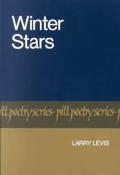 There is so much to admire in Winter Stars that it is difficult to know where to begin. One small but interesting angle on Levis’ work is to notice how often he describes “what is not.” He seems, in this way, to be drawing circles around possibilities in life, keenly aware of his place outside that circle which contains happiness, meaning, comfort, centrality, success. We can only really see darkness as contrasted with light, the void by the solid matter that surrounds it. So, to this end, “that which is not” appears time and again in some of Levis’ most compelling poems.
There is so much to admire in Winter Stars that it is difficult to know where to begin. One small but interesting angle on Levis’ work is to notice how often he describes “what is not.” He seems, in this way, to be drawing circles around possibilities in life, keenly aware of his place outside that circle which contains happiness, meaning, comfort, centrality, success. We can only really see darkness as contrasted with light, the void by the solid matter that surrounds it. So, to this end, “that which is not” appears time and again in some of Levis’ most compelling poems.
My favorite poem of the collection, “The Cry”, is rife with denied possibilities, where, in Parlier, “the prostitutes slept, as always, / With the small-time businessmen, their hair smelling of pomade, / Who did not dream.” and the homeless camped by the river see, “in their sleep how the cold shape of fire / Made, from each crystal of ash, the gray morning, / Which consoled no one.” and his parents’ bodies, asleep, “Were not beautiful, like distant cities.” It is Levis’ keen awareness–that men could dream, that the morning could console, that bodies could be beautiful–that makes his relationship to this world poignant and compelling.
These are long, intricate, complex poems that seem spare and devastating. Partly, it is through meditating so carefully on “what is not” that we experience, most directly, all that is lacking–in relationships, environments and life itself. At times, Levis embarks on almost Homeric similes which lead us further and further down the sorrowful trail of “what is not.”
In the title poem, “Winter Stars”, themselves mean to the author, “everything / It cannot say.” This sense of being removed–like stars in the sky–from that which is both beautiful and believable and, most important, being conscious of this removal–is what drives his work around the edge of the void. In the Elegies section of the book, “Though His Name Is Infinite, My Father Is Asleep” begins, “When my father disappeared, / He did not go into hiding.” Much further, Levis tells us to:
Say finally there is no way
To document this, or describe
The passing of a father, […]
And say, too, how you disliked
And loved him, how he stays up
All night now in two worlds,
How his worn out, infinite name
Outwits death when you say it.
And say finally how the things
He had to do for you
Humiliated him until
He could not get his breath, & say
How much they mattered, how
Necessary he was. […]
This is a masterpiece of not eulogizing, of taking no conventional turn toward love or anger, but sweeping all such sentiments up in a moment of denying. The moment gets so swept up, in fact, as to become almost confused. The line “He could not get his breath & say” seems to be about the father’s speech, but is, in fact, a continuation of the directive “say…” wherein Levis addresses the reader and implores the reader, in fact, to say what Levis can not–“how / Necessary he was.”